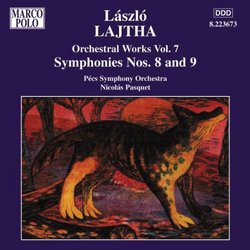Buy this wonderful CD!
G.D. | 03/29/2001
(5 out of 5 stars)
"Laszlo Lajtha (1892-1963) was one of the greatest Hungarian composers of the 20th century, and these two symphonies were written at the end of his life. These works are both melodious and fantastically orchestrated. We can feel the French influence (Ravel) but also the presence of some (Bartokian) folk elements. However, these two symphonies are really original, and they convey a very personal sense of drama. If you love 20th century music, buy this very well played and recorded CD!!!"
Magical music in very good performances
G.D. | Norway | 03/03/2009
(5 out of 5 stars)
"Lásló Lajtha has never received the recognition he obviously deserves. I am not going to claim that his music is on the level of Bartók's, maybe not even Kodály, but he isn't far behind, and his neglect may be more due to political circumstances than anything to do with his music. Besides, Lajtha was, as opposed to the two mentioned, a symphonist - a great symphonist, at that - and the Marco Polo series of his orchestral music is hence a very important one.
This disc of his final two symphonies is furthermore probably the best one. These are spell-binding, melodic, poignant and slightly impressionistic scores; a mixture of late Debussy (Jeux), Kodály and Martinu might give you an indication, but Lajtha doesn't really sound anywhere like any of them. The orchestration is a wonder in itself, consisting of what could almost be said to be shimmeringly magical, surprising and surprisingly effective matrices of percussion (eight percussionists here, in fact), celesta, saxophone and - especially, since Lajtha has a remarkable ability to write effectively for that instrument in an orchestral context - harp. The textures vary from the airy, feathery and ethereally whispering to the beautifully velvety, the windswept and harrowing and the ferociously full-blooded - in addition to the formal structure of the music itself, the instrumentation and shifts in texture almost seems to have its own symphonic pattern to it.
The eighth symphony, which starts, rather surprisingly, with a scherzo, is overall a dark and tragic work but with a sense of defiance (it was written in the aftermath of the 1956 events). The ninth is less angry and more surreal - almost angelic; there are some material, especially in the last movement, that is very much inspired by early medieval chants and drones - and given Lajtha's instrumental setting and ear for unusual sonorities, the total effect is utterly magical.
The Pécs Symphony Orchestra under Pasquet fortunately plays these works impressively, and they are very much able to bring out the various sonorities and changes in texture. If you were very picky, you'd perhaps point out a certain lack of forward momentum at times, but this is not enough to detract from the firm recommendation that this disc deserves. The sound quality is excellent."


 Track Listings (7) - Disc #1
Track Listings (7) - Disc #1